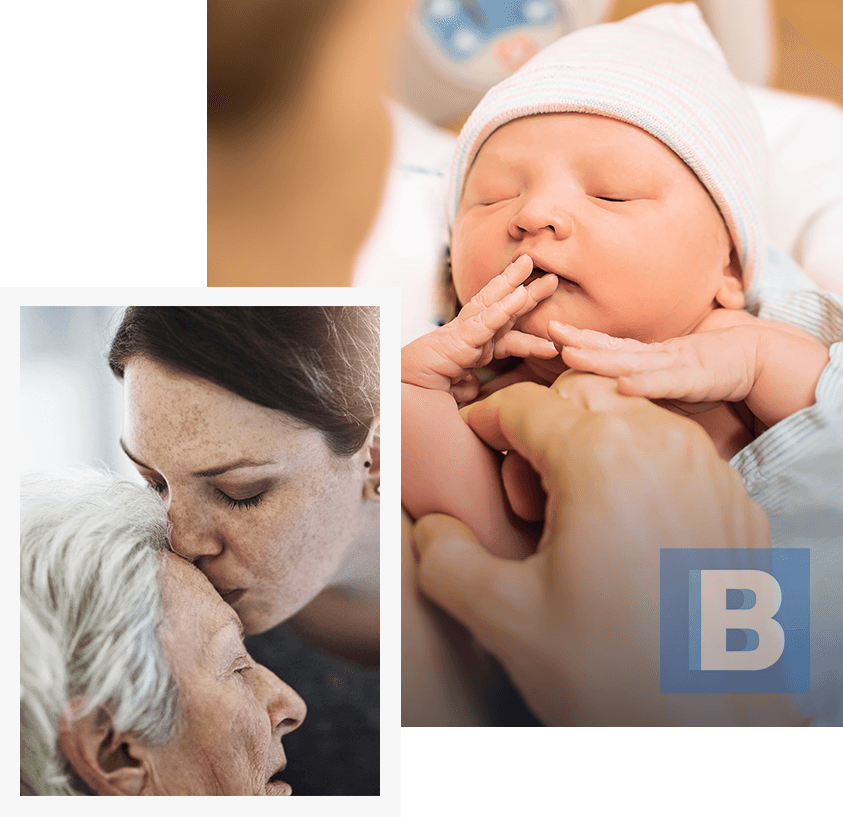

Nursing Home Abuse

Dundalk Nursing Home Abuse Lawyer
It can be very difficult for a victim of nursing home abuse or neglect to report the abuse, even to family. However, if a victim does report it, family, the authorities, and a lawyer can get involved. If you or your loved one is a victim of nursing home abuse or neglect, our firm can help.
When you hire a nursing home lawyer from our team at Brown & Barron, we can work to hold the nursing home accountable and seek compensation for your loved one’s abuse. We have over 137 years of combined experience helping victims of nursing home abuse and neglect. During a free case evaluation, we’ll tell you more about how a Dundalk nursing home abuse & neglect attorney will help you and your loved one.
Contact Us to Learn How a Dundalk Nursing Home Abuse & Neglect Attorney Can Help You
Our attorneys have extensive experience in nursing home abuse and neglect cases, so you can be confident in your attorney’s ability to handle your case. We recovered over $82 million for our clients from 2017 to 2021 and have won numerous awards, including a 10.0 rating from Avvo.
Get in touch with a nursing home abuse lawyer serving Dundalk, (410) 698-1717 for a free case evaluation.
The Common Signs of Nursing Home Abuse and Neglect
If you believe your loved one is a victim of abuse and is in immediate danger, you should call the authorities and the Maryland Department of Health. If there is no immediate danger, you can speak to a loved one, another trusted person, or a nursing home abuse lawyer from our firm.
You might not be completely sure if your loved one is experiencing nursing home abuse or neglect. In this case, you should look for more signs of abuse in addition to any signs you’ve already recognized.
Such signs may include:
- Poor hygiene
- Any injuries you believe your loved one may have suffered in the nursing home, such as a bruise or a fracture
- Bedsores that haven’t been treated or that have become chronic
- Your loved one seeming like they’re drugged or groggy
- Soiled bed sheets or clothes
- Any missed doses of your loved one’s medicine
- New medications that don’t seem necessary
- Any bruising around your loved one’s private areas
- Inexplicable changes in your loved one’s financial accounts
- Any assets, like jewelry, that are missing
- Inexplicable changes in your loved one’s behavior and/or personality
- A caregiver trying to prevent you and your loved one from being alone together
The Types of Nursing Home Abuse
Abuse can include neglect, emotional abuse, assault, or another kind of mistreatment. Since nursing home residents depend on the caring treatment of caregivers, any kind of mistreatment by caregivers could be considered abusive.
Below are the most common kinds of abuse in nursing homes and examples of each.
Neglect
Neglect is often overlooked because a resident or their family may not notice how harmful it is. However, it is dangerous, potentially leading to physical harm and even death. It’s also abusive and a violation of trust.
Nursing home residents require care and attention, and when a caregiver doesn’t provide these things, this is neglect, whether intentional or not. An example of neglect could be a caregiver failing to dress or bathe a person who can’t do these things independently or not giving them food or necessary medication.
Nursing homes themselves can be neglectful, too, such as by not hiring enough staff.
Financial Abuse
Another kind of abuse that may be overlooked is financial abuse. With financial abuse, a person or facility steals another person’s assets or money. For instance, a nursing home may steal a resident’s money by billing them for unnecessary services.
Physical Abuse
This form of abuse involves physically harming another person, such as hitting, pushing, kicking, or using physical restraints on a nursing home resident unnecessarily.
Emotional Abuse
Generally, emotional abusers want to change how a person acts and behaves, so a common sign of emotional abuse is a loved one behaving differently. An abuser may try to intimidate or belittle a person or threaten them to discourage reporting another kind of abuse.
Sexual Abuse
Sadly, this kind of abuse can also be common in nursing homes. It involves any kind of unwanted sexual activity, such as a caregiver sexually assaulting a resident while the resident is sleeping. It may be especially difficult for your loved one to report sexual abuse, so you may have to call the authorities and the Maryland Department of Health if you suspect they are a victim.
Contact Brown & Barron online today to schedule a free case review with a with a nursing home abuse lawyer serving Dundalk.
The Damages Nursing Home Abuse Victims Can Claim
On behalf of your loved one, you may be able to claim certain damages in a nursing home abuse claim or lawsuit. These damages can help your family relocate your loved one and provide them with some recompense for their abuse. Also, by pursuing compensation, you’ll hold the nursing home accountable and may be able to help prevent future instances of abuse at that facility.
You may be able to claim these damages and others:
- The costs of any medical treatment or continual care your loved one requires after their abuse
- The costs of any assistive devices your loved one needs
- The costs of any assets stolen
- The cost of having to relocate to another facility
- Your loved one’s pain, suffering, and mental anguish
- Wrongful death damages if your loved one did not survive their injuries
During a free case review, we’ll tell you more about us and how a Dundalk nursing home abuse & neglect attorney can help you with your case.
Contact us today for your free case review.
Help for Elderly Victims of Abuse and Neglect in Nursing Homes
If your loved one is out of immediate danger, it’s time to hire one of our firm’s nursing home abuse and neglect attorneys. Your attorney will seek your due compensation for you while you focus on helping your loved one recover. Your initial consultation with our firm will be completely free of charge.
To help you recover compensation for your loved one, your Dundalk nursing home abuse and neglect lawyer will:
- Investigate the incident, gathering proof of your loved one’s abuse
- Collect statements about the incident from witnesses and experts
- Help you determine which damages to claim
- File your claim or lawsuit for you
- Communicate on your behalf with the nursing home and their insurer
- Negotiate a settlement with the insurer or litigate your case in court
By taking legal action soon, you’ll help your attorney meet any deadlines for your case, such as the deadline for filing a nursing home abuse lawsuit in Maryland. This deadline is the earlier of either five years from the date of a medical malpractice incident or three years from the date of the discovery of a medical malpractice-related issue, per Md. Cts. & Jud. Proc. § 5-109.


Our Difference
Why Choose Brown & Barron, LLC?
-
An Unwavering Commitment to What's RightBrown and Barron is a law firm that fights for the most vulnerable members of society to achieve a true sense of closure after a devasting event. We are passionate about the people we work with and the cases we argue and will do whatever it takes to not only restore your justice but also restore your life.
-
A History of Being Responsive & Accessible
Our firm culture ensures that all clients feel like family, as evidenced by more than 150 five-star Google reviews. We ensure from the beginning of your case until the very end that your voice is not only heard but echoed until you obtain the justice you deserve. We work with you throughout the process to make sure that the results we arrive at make sense for you and your family.
-
A Team of Dedicated AdvocatesOur legal team not only has over 137 combined years of trial experience, but we pride ourselves on being the top attorneys in our field. With a specialization in complex cases, we have attorneys who have not only graduated from the most prestigious universities, but who have also proved to be recognized with the profession's most distinguished honors.
-
A Proven Track Record of Success
Brown & Barron has a history of results-oriented representation and we have obtained more than $90 million for our clients since 2017. Our team has a proven record of restoring lives and restoring justice.



Hear from Our Clients
Over 150 5-Star Reviews from Our Past Clients
-
"Brown & Barron, LLC has to be one of the best law firms in the state of Maryland"
Brown & Barron, LLC has to be one of the best law firms in the state of Maryland, possibly the entire country. The quality of their service is second to none. They go above and beyond to serve their clients and get the job done.
- Eric B. -
"Exceeded All Expectations"
The best professional experience I have ever been a part of. I trusted them the entire way, and they exceeded all expectations.
- Darius L. -
"I would recommend Brown & Barron to anyone who needs a lawyer for a medical malpractice case."
Brown & Barron provided efficient, straight-up, and straightforward services in my medical malpractice case. They answered all my questions and kept me informed every step of the way.
- D.D. -
"Working with this law firm gave me confidence and comfort during an emotional and difficult time."
After a two-year process, my case is resolved. I would like to commend and highly recommend Mr. Chris Casciano for his diligence, attention to detail, and support for myself and my family.
- A.L.